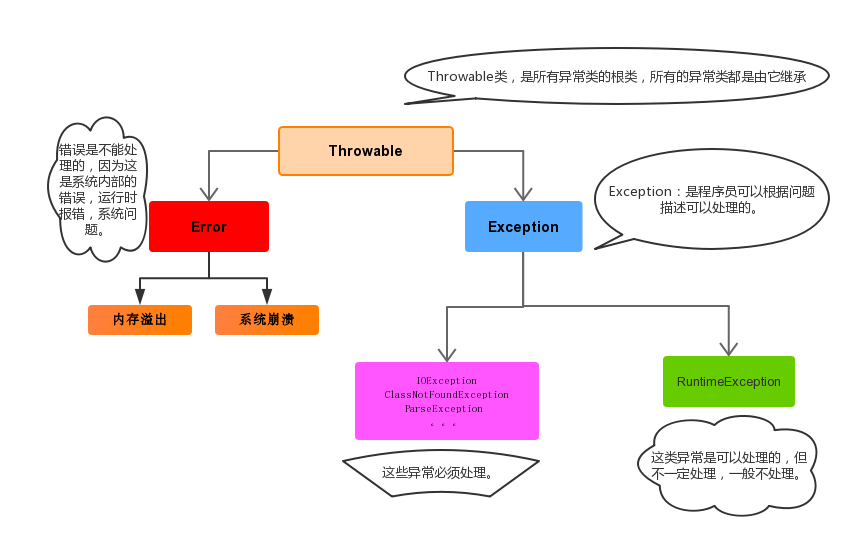异常体系

异常的处理
throw抛出
public class ThrowDemo {
public static void main(String[] args) {
//创建一个数组
int[] arr = {2,4,52,2};
//根据索引找对应的元素
int index = 4;
int element = getElement(arr, index);
System.out.println(element);
System.out.println("over");
}
/*
* 根据 索引找到数组中对应的元素
*/
public static int getElement(int[] arr,int index){
if(arr == null){
/*
判断条件如果满足,当执行完throw抛出异常对象后,方法已经无法继续运算。
这时就会结束当前方法的执行,并将异常告知给调用者。这时就需要通过异常来解决。
*/
throw new NullPointerException("要访问的arr数组不存在");
}
//判断 索引是否越界
if(index<0 || index>arr.length-1){
/*
判断条件如果满足,当执行完throw抛出异常对象后,方法已经无法继续运算。
这时就会结束当前方法的执行,并将异常告知给调用者。这时就需要通过异常来解决。
*/
throw new ArrayIndexOutOfBoundsException("哥们,角标越界了~~~");
}
int element = arr[index];
return element;
}
}throws声明
import java.io.File;
import java.io.FileNotFoundException;
public class TestException {
public static void main(String[] args) throws FileNotFoundException {
readFile("不敲代码学会Java秘籍.txt");
}
// 如果定义功能时有问题发生需要报告给调用者。可以通过在方法上使用throws关键字进行声明
public static void readFile(String filePath) throws FileNotFoundException{
File file = new File(filePath);
if(!file.exists()){
throw new FileNotFoundException(filePath+"文件不存在");
}
}
}try-catch捕获
try{
}catch(...){
}finally{
无论try中是否发生异常,也无论catch是否捕获异常,也不管try和catch中是否有return语句,都一定会执行
}面试题
public static void main(String[] args) {
int test = test(3,5);
System.out.println(test);//8
}
public static int test(int x, int y){
int result = x;
try{
if(x<0 || y<0){
return 0;
}
result = x + y;
return result;
}finally{
result = x - y;
}
}public class Test04 {
static int i = 0;
public static void main(String[] args) {
System.out.println(test());//2
}
public static int test(){
try{
return ++i;
}finally{
return ++i;
}
}
}异常的注意事项
- 运行时异常被抛出可以不处理。即不捕获也不声明抛出
- 如果finally有return语句,永远返回finally中的结果
- 如果父类抛出了多个异常,子类重写父类方法时,抛出和父类相同的异常或者是父类异常的子类或者不抛出异常
- 父类方法没有抛出异常,子类重写父类该方法时也不可抛出异常。此时子类产生该异常,只能捕获处理,不能声明抛出
包装类
| 序号 | 基本数据类型 | 包装类(java.lang包) |
|---|---|---|
| 1 | byte | Byte |
| 2 | short | Short |
| 3 | int | Integer |
| 4 | long | Long |
| 5 | float | Float |
| 6 | double | Double |
| 7 | char | Character |
| 8 | boolean | Boolean |
| 9 | void | Void |
装箱与拆箱
JDK1.5后,可以子哦对那个装箱与拆箱
只能与自己对应的类型间才能实现自动装箱与拆箱
Integer i = 4;//自动装箱。相当于Integer i = Integer.valueOf(4); i = i + 5;//等号右边:将i对象转成基本数值(自动拆箱) i.intValue() + 5; //加法运算完成后,再次装箱,把基本数值转成对象 Integer i = 1; Double d = 1;//错误的,1是int类型
包装类的一些API
把基本数据类型转换为字符串
int a = 10;
//String str = a;//错误的
//方式一:
String str = a + "";
//方式二:
String str = String.valueOf(a);把字符串转为基本数据类型
int a = Integer.parseInt("整数的字符串");
double a = Double.parseDouble("小数的字符串");
boolean b = Boolean.parseBoolean("true或false");转大小写
Character.toUpperCase('x');
Character.toLowerCase('X');转进制
Integer.toBinaryString(int i)
Integer.toHexString(int i)
Integer.toOctalString(int i)包装类对象的缓存问题
| 包装类 | 缓存对象 |
|---|---|
| Byte | -128~127 |
| Short | -128~127 |
| Integer | -128~127 |
| Long | -128~127 |
| Float | 没有 |
| Double | 没有 |
| Character | 0~127 |
Integer i = 1;
Integer j = 1;
System.out.println(i == j);//true
Integer i = 128;
Integer j = 128;
System.out.println(i == j);//false
Integer i = new Integer(1);//新new的在堆中
Integer j = 1;//这个用的是缓冲的常量对象,在方法区
System.out.println(i == j);//false
Integer i = new Integer(1);//新new的在堆中
Integer j = new Integer(1);//另一个新new的在堆中
System.out.println(i == j);//false
Integer i = new Integer(1);
int j = 1;
System.out.println(i == j);//true,凡是和基本数据类型比较,都会先拆箱,按照基本数据类型的规则比较
Double d1 = 1.0;
Double d2 = 1.0;
System.out.println(d1==d2);//false 比较地址,没有缓存对象,每一个都是新new的
